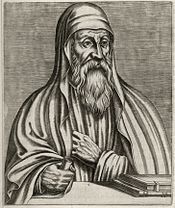
Hexapla (Koinē Greek: Ἑξαπλᾶ, lit. 'sixfold'), also called Origenis Hexaplorum, is a critical edition of the Hebrew Bible in six versions, four of them translated into Greek,[1] preserved only in fragments. It was an immense and complex word-for-word comparison of the original Hebrew Scriptures with the Greek Septuagint translation and with other Greek translations.[2] The term especially and generally applies to the edition of the Old Testament compiled by the theologian and scholar Origen sometime before 240.

The subsisting fragments of partial copies have been collected in several editions, that of Frederick Field (1875) being the most fundamental on the basis of Greek and Syrian testimonies. The surviving fragments are now being re-published (with additional materials discovered since Field's edition) by an international group of Septuagint scholars. This work is being carried out as The Hexapla Project[3] under the auspices of the International Organization for Septuagint and Cognate Studies,[4] and directed by Dr Neil McLynn. The members of the editorial board are: Peter J. Gentry (Southern Baptist Theological Seminary and the Göttinger Septuaginta-Unternehmen), Dr Alison G. Salvesen (Oxford University), and Bas ter Haar Romeny (Leiden University).
| Part of a series on |
| Origenism |
|---|
 |
|
|
- ^ Epiphanius' Treatise on Weights and Measures - The Syriac Version (ed. James Elmer Dean), University of Chicago Press 1935, p. 36
- ^ Trigg, Joseoph W. - Origen - The Early Church Fathers - 1998, Routledge, London and New York, page 16. Retrieved 31 August 2015.
- ^ "Website of the Hexapla Project". Archived from the original on 27 March 2019. Retrieved 13 January 2020.
- ^ Website of the International Organization for Septuagint and Cognate Studies